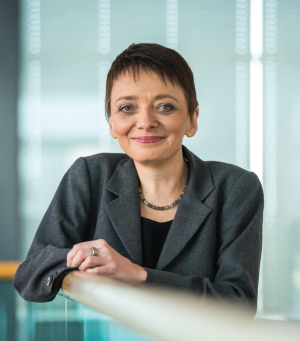Cardiovascular
Jeanette Erdmann (1965–2023)
Jeanette Erdmann, professor of human genetics at the University of Lübeck and the German Center for Cardiovascular Research (DZHK), sadly passed away on 9 July 2023 at the age of 57. We grieve the loss of an extraordinary woman who embraced her scientific profession with unwavering dedication, contributing to groundbreaking work in the field of coronary artery disease (CAD) and myocardial infarction genetics. Her accomplishments led to her election to the National Academy of Science Leopoldina in 2021 as an outstanding scientist, a distinction granted to only a few elite researchers in Germany.
Credit: Institute for Cardiogenetics, Lübeck, Germany
Jeanette was born with a form of muscular dystrophy that led to delayed physical development and health challenges throughout her life. Despite these challenges, she obtained a master’s degree in biology from the University of Cologne, followed by a doctoral degree in human genetics at the University of Bonn. She then pursued postdoctoral fellowships at the Charité–University Medicine Berlin and the Universities of Regensburg and Lübeck, where she embarked on her life-long interest in the genetics of cardiovascular disease.
We vividly recall the pioneering results from the first genome-wide association study (GWAS) for CAD and myocardial infarction, which led to the identification of the 9p21 locus in 20071. After that, Jeanette had a key role in the foundation of CARDIoGRAM, conducting a meta-analysis of GWAS2 and setting an example for the many meta-analyses of GWAS on complex diseses to follow. The CARDIoGRAM data were used in several high-impact publications3,4,5, demonstrating the successful and rapid application of the GWAS approach in CAD-related diseases.
In 2012, Jeanette became the first female professor at DZHK, a tribute to her exceptional achievements, pioneering spirit and collaborative approach. She established the Institute for Cardiogenetics at the University of Lübeck in 2013, expanding her networks at the national and international levels. She demonstrated her leadership in further consortia, including CARDIoGRAMplusC4D, which united diverse GWAS efforts to enhance the statistical power — an essential component in identifying additional loci associated with CAD or myocardial infarction. As a consequence, she contributed to the identification of almost all known 360 cardiovascular risk loci1,6,7,8, underscoring her visionary dedication.
Jeanette’s journey culminated in the grand symposium celebrating the ten-year milestone of her Institute in 2023. During this event, colleagues, collaborators and friends commemorated her Institute’s accomplishments and engaged in discussions about the forthcoming challenges in the realm of GWAS and post-GWAS studies on CAD. Jeanette added her vision to pave the way from GWAS of CAD and molecular mechanisms for CAD development to the identification of potential targets for therapy.
Jeanette’s commitment to sex and gender aspects in health research earned her the 2021 BIH (Berlin Institute of Health) Excellence award. Her last publication in Nature Genetics6 showed that some genetic variants affect CAD risk in a sex-specific, sometimes opposing manner, with implications for personalized medicine. Notably, she supported initiatives such as the ‘F1’ scientific generation through her highly supportive mentorship and commitments. For example, one of her PhD students, Redouane Aherrahrou, secured funding from the Corona Stiftung and other grants to study sex-specific aspects in vascular calcification, an important component of CAD. He credits Jeanette for shaping his success over the past decade, from a PhD student to an independent principal investigator9.
Remarkably, Jeanette diagnosed the genetic cause of her own muscular dystrophy, a mutation in the COL6 gene, beautifully recounting her story in a personal paper in 201310. She started to prioritize the advancement of therapy for COL6 using the CRISPR–Cas approach, and expanded her portfolio to include COL6 muscular dystrophy research. Her dedication and willingness to assist, even amid her own challenges, left a lasting impression. She attended most symposia, congresses, meetings, retreats and events in person, despite her limited mobility in later years, or virtually when long travel distances made it challenging, contributing her insights and support.
Jeanette’s research plans were characterized by clarity, scientific rigor and a genuine desire to comprehend the intricate interplay between genes and function, as well as a vision to translate basic research findings into clinical applications.
All of this came to an end with an accident at home. We have lost a role model scientist, a cherished colleague, and an inspiring mentor to young researchers. Her wisdom, dedication and unwavering support have left an indelible mark on her trainees, providing them with the confidence and empowerment to continue drawing inspiration from her legacy in all their future endeavors.
References
-
Samani, N. J. et al. N. Engl. J. Med. 357, 443–453 (2007).
Google Scholar
-
Schunkert, H. et al. Nat. Genet. 43, 333–338 (2011).
Google Scholar
-
Suhre, K. et al. Nature 477, 54–60 (2011).
Google Scholar
-
International Consortium for Blood Pressure Genome-Wide Association Studies. Nature 478, 103–109 (2011).
Google Scholar
-
Gieger, C. et al. Nature 480, 201–208 (2011).
Google Scholar
-
Aragam, K. G. et al. Nat. Genet. 54, 1803–1815 (2022).
Google Scholar
-
Erdmann, J., Kessler, T., Munoz Venegas, L. & Schunkert, H. Cardiovasc. Res. 114, 1241–1257 (2018).
Google Scholar
-
Erdmann, J. et al. Nat. Genet. 41, 280–282 (2009).
Google Scholar
-
Aherrahrou, R. et al. Circ. Res. 132, 323–338 (2023).
Google Scholar
-
Erdmann, J. & Schunkert, H. Neuromuscul. Disord. 23, 503–505 (2013).
Google Scholar
Author information
Authors and Affiliations
Corresponding author
Ethics declarations
Competing interests
The authors declare no competing interests.
Rights and permissions
Reprints and Permissions
About this article
Cite this article
Aherrahrou, R., Eschenhagen, T., König, I.R. et al. Jeanette Erdmann (1965–2023).
Nat Genet (2023). https://doi.org/10.1038/s41588-023-01599-1
-
Published: 20 November 2023
-
DOI: https://doi.org/10.1038/s41588-023-01599-1

